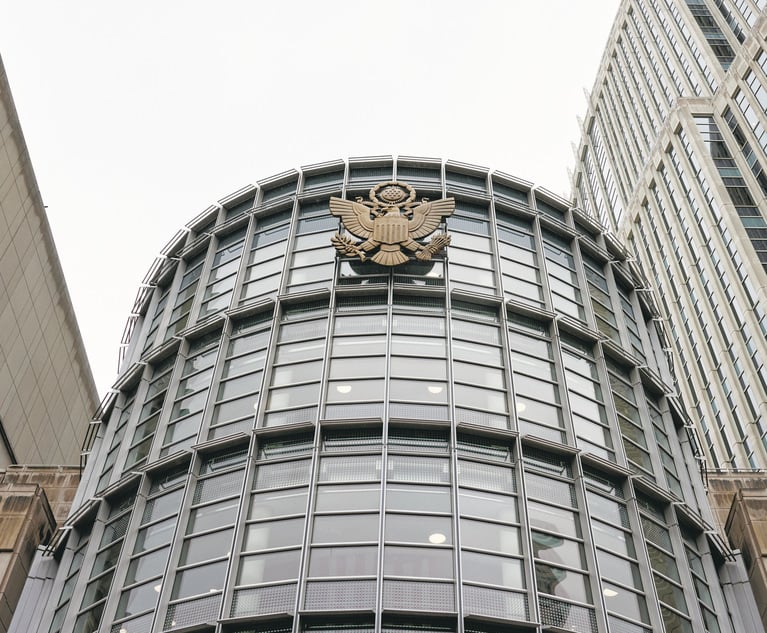Can Commercial Tenants Really Avoid Rent During the Pandemic Using the Frustration-of-Purpose Doctrine?
Recent decisions and the use of the frustration-of-purpose doctrine to absolve commercial tenants of their obligation to pay rent could signal headwinds for the New York commercial real-estate market—and the economy more generally
June 18, 2021 at 02:40 PM
7 minute read
 For the last year, commercial tenants—including some big-name tenants like Hugo Boss, Christian Louboutin and Gap—have been arguing that their rent obligations should be eliminated or reduced during the pandemic under the frustration-of-purpose doctrine. While most courts have rejected these arguments, some recent decisions have come out in tenants' favor on this point. Some have applauded these latter decisions as providing much needed rent relief to struggling tenants, but these decisions and the use of the frustration-of-purpose doctrine to absolve commercial tenants of their obligation to pay rent could signal headwinds for the New York commercial real-estate market—and the economy more generally.
For the last year, commercial tenants—including some big-name tenants like Hugo Boss, Christian Louboutin and Gap—have been arguing that their rent obligations should be eliminated or reduced during the pandemic under the frustration-of-purpose doctrine. While most courts have rejected these arguments, some recent decisions have come out in tenants' favor on this point. Some have applauded these latter decisions as providing much needed rent relief to struggling tenants, but these decisions and the use of the frustration-of-purpose doctrine to absolve commercial tenants of their obligation to pay rent could signal headwinds for the New York commercial real-estate market—and the economy more generally.
How does the frustration-of-purpose doctrine apply to commercial leases in the COVID-19 era? The argument is simple. The frustration-of-purpose doctrine excuses a party's contractual performance when the underlying purpose of the contract is frustrated and the frustrated purpose is "'so completely the basis of the contract that, as both parties understood, without it, the transaction would have made little sense.'" Jack Kelly Partners v. Zegelstein, 140 A.D.3d 79, 85 (1st Dep't 2016) (citation omitted). So, as commercial tenants claim, when the government prohibits a tenant from using its space or limits the ways in which it may use that space (including through capacity limitations), the "purpose" of the lease—to use the space in the way contemplated by the lease and as desired by the tenant—is frustrated. In other words, the lease would have "made little sense" if the tenant could not meaningfully use the space it was leasing.
This argument has appeal, and is surprisingly intuitive. Indeed, last April, I initially suggested that this doctrine might work in commercial-leasing cases (though, as courts started to grapple with this issue, I later wrote that courts were generally rejecting this approach).
This content has been archived. It is available through our partners, LexisNexis® and Bloomberg Law.
To view this content, please continue to their sites.
Not a Lexis Subscriber?
Subscribe Now
Not a Bloomberg Law Subscriber?
Subscribe Now
NOT FOR REPRINT
© 2025 ALM Global, LLC, All Rights Reserved. Request academic re-use from www.copyright.com. All other uses, submit a request to [email protected]. For more information visit Asset & Logo Licensing.
You Might Like
View All
Disbarred NY Atty Receives 54-Month Prison Sentence After $3M Embezzlement
3 minute read
Unit Owners Sued Board for Failure To Maintain Adequate Fire Insurance: This Week in Scott Mollen’s Realty Law Digest


Law Firms Mentioned
Trending Stories
- 1Trump's Pick for SEC Chair Likely to Stymie Shareholder Proposals from ESG Advocates
- 2Adobe’s Chief Cyber Legal & Privacy Officer Talks Managing Gen AI Risks, Cyber Training
- 3The M&A Partners Who Drove the Most Business as Deal Leads Last Year
- 4Recent Ford Bronco Battery Recall Draws Pa. Class Action
- 5Office of Special Counsel Chief Challenges Firing 'Without Cause'
Who Got The Work
J. Brugh Lower of Gibbons has entered an appearance for industrial equipment supplier Devco Corporation in a pending trademark infringement lawsuit. The suit, accusing the defendant of selling knock-off Graco products, was filed Dec. 18 in New Jersey District Court by Rivkin Radler on behalf of Graco Inc. and Graco Minnesota. The case, assigned to U.S. District Judge Zahid N. Quraishi, is 3:24-cv-11294, Graco Inc. et al v. Devco Corporation.
Who Got The Work
Rebecca Maller-Stein and Kent A. Yalowitz of Arnold & Porter Kaye Scholer have entered their appearances for Hanaco Venture Capital and its executives, Lior Prosor and David Frankel, in a pending securities lawsuit. The action, filed on Dec. 24 in New York Southern District Court by Zell, Aron & Co. on behalf of Goldeneye Advisors, accuses the defendants of negligently and fraudulently managing the plaintiff's $1 million investment. The case, assigned to U.S. District Judge Vernon S. Broderick, is 1:24-cv-09918, Goldeneye Advisors, LLC v. Hanaco Venture Capital, Ltd. et al.
Who Got The Work
Attorneys from A&O Shearman has stepped in as defense counsel for Toronto-Dominion Bank and other defendants in a pending securities class action. The suit, filed Dec. 11 in New York Southern District Court by Bleichmar Fonti & Auld, accuses the defendants of concealing the bank's 'pervasive' deficiencies in regards to its compliance with the Bank Secrecy Act and the quality of its anti-money laundering controls. The case, assigned to U.S. District Judge Arun Subramanian, is 1:24-cv-09445, Gonzalez v. The Toronto-Dominion Bank et al.
Who Got The Work
Crown Castle International, a Pennsylvania company providing shared communications infrastructure, has turned to Luke D. Wolf of Gordon Rees Scully Mansukhani to fend off a pending breach-of-contract lawsuit. The court action, filed Nov. 25 in Michigan Eastern District Court by Hooper Hathaway PC on behalf of The Town Residences LLC, accuses Crown Castle of failing to transfer approximately $30,000 in utility payments from T-Mobile in breach of a roof-top lease and assignment agreement. The case, assigned to U.S. District Judge Susan K. Declercq, is 2:24-cv-13131, The Town Residences LLC v. T-Mobile US, Inc. et al.
Who Got The Work
Wilfred P. Coronato and Daniel M. Schwartz of McCarter & English have stepped in as defense counsel to Electrolux Home Products Inc. in a pending product liability lawsuit. The court action, filed Nov. 26 in New York Eastern District Court by Poulos Lopiccolo PC and Nagel Rice LLP on behalf of David Stern, alleges that the defendant's refrigerators’ drawers and shelving repeatedly break and fall apart within months after purchase. The case, assigned to U.S. District Judge Joan M. Azrack, is 2:24-cv-08204, Stern v. Electrolux Home Products, Inc.
Featured Firms
Law Offices of Gary Martin Hays & Associates, P.C.
(470) 294-1674
Law Offices of Mark E. Salomone
(857) 444-6468
Smith & Hassler
(713) 739-1250






